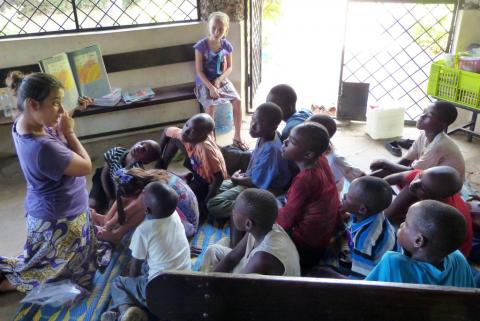
Anita Klueg, a returned Maryknoll Lay Missioner who lived and worked in Kenya, reflects on the blessing of being a witness to God's work.
As a returned Maryknoll Lay Missioner in Mombasa, Kenya for seven years, first as a couple and eventually a family with two daughters, I have been blessed to be a witness to God’s work in myself and God’s presence and surprises in the joy and the sadness of mission.
Some of the joys were when I taught an eight-year-old, Hamza, how to read his first paragraph and when I broke fast with a Muslim family during Ramadan. The sadness of mission was attending a burial for the same student, Hamza, just two years later because of sickness from drinking unclean water with a poor immune system – something easily curable for those with resources.
In the reading from Luke, the disciples witness and experience a miracle while fishing. As a part of this miracle, they receive a call to be fishers of people. In the reading from Isaiah, the call is to be sent forth and ready to respond.
As a campus minister at the University of Detroit Mercy, I have been blessed to be a witness on an immersion experience in Nogales, Arizona, and Mexico. Serendipitously, this visit coincided with President Donald Trump’s televised speech about a "crisis of the heart and a crisis of the soul," at the U.S.-Mexico border. I cringed at the president’s words, having listened to two women in a migrant shelter sharing two very different stories of suffering that same day.
One of the women was Elba, who crossed the border with her parents when she was only 15 years old and eventually made a life for herself and her four children by working two jobs at a restaurant and cleaning homes for over twenty years in the U.S. Then, during the week of New Year's, the police stopped her for a traffic violation, put her in jail for two days while ICE personnel were on holiday, then deported her. Elba was taken away from two special needs children, the youngest only four years old. I wonder how we save our country money by taking on the costs of care for her children now that she no longer can provide for them. I wonder how Elba will bear the tragedy of being away from her children and trying to settle in a country where she did not grow up.
Jesus, what does it mean to be fishers of people? How am I to be sent? Where will I go?
I could choose to feel helpless by what I have witnessed. Yet my experience of mission and my experiences each day in new relationships with people I meet, have taught me the value of “building bridges” (a value of Maryknoll Lay Missioners).
As a witness to Hamza’s and Elba’s stories, I am now a part of their stories. As a witness, I bear a responsibility not to only observe and share facts. I am called, as Ex Corde Ecclesiae, the document that identifies what constitutes Catholic identity at Catholic colleges and universities, says to “demonstrate the courage to express the uncomfortable truths, truths that may clash with public opinion but that are also necessary to safeguard the authentic good of society.”
My hope for each of us is to know the blessing of our role as witness to our neighbors and all the marginalized people of this world. Jesus calls us to the margins.
For our family, that meant an extended period of time in another part of the world, sharing life with widows, orphans, and prisoners. For any of us, it can involve going to the margins of our cities or working with the poor and vulnerable in our neighborhoods. Invariably, in going to the margins, we encounter Jesus in new ways and those on the margins of our world, in turn, send us back in reverse mission to the comfortable and content.
Those on the margins call us not to just amplify their stories but also to teach us the importance of simplicity and of profound faith. Meaningful experiences of listening and solidarity call us to a conversion that leads to more physical, emotional, and spiritually sustainable ways of living. If we live with this awareness, then our role as witness is truly blessed.
